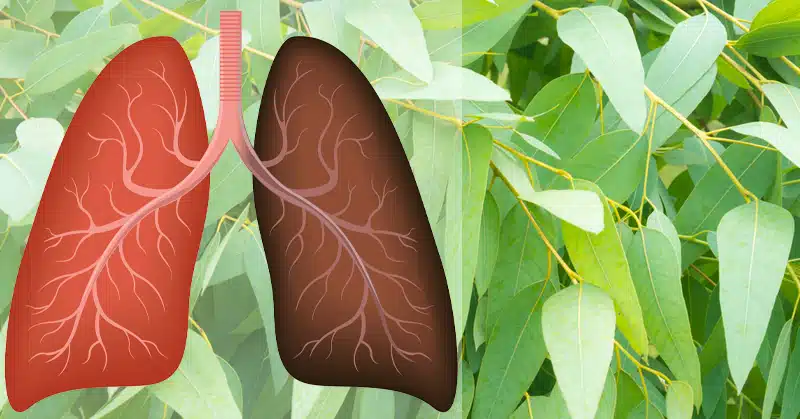In today’s world, lung health is more important than ever. Our lungs often bear the brunt of environmental and lifestyle challenges, whether due to pollution, smoking, or infections.
Fortunately, nature offers a wealth of plants and herbs known for their healing properties, particularly in supporting and improving lung health.
These natural remedies can help repair lung damage, combat infections, and boost overall respiratory function.
Here are nine plants and herbs that you can incorporate into your routine to promote healthier lungs.
1. Eucalyptus (Eucalyptus globulus)
Benefits for Lung Health
Eucalyptus is renowned for its ability to support respiratory health. The primary active compound, eucalyptol (cineole), has potent anti-inflammatory, antioxidant, and decongestant properties.
How It Helps:
- Decongestant: Helps clear mucus and congestion in the airways.
- Antibacterial: Fights off bacterial infections in the respiratory system.
- Anti-inflammatory: Reduces inflammation, easing breathing difficulties.
How to Use:
- Inhalation: Add a few drops of eucalyptus oil to hot water and inhale the steam.
- Tea: Brew eucalyptus leaves to make a soothing tea.
2. Peppermint (Mentha piperita)
Benefits for Lung Health
Peppermint contains menthol, which acts as a natural decongestant and soothes the respiratory tract.
How It Helps:
- Decongestant: Helps open up the airways and makes breathing easier.
- Antimicrobial: Fights off respiratory infections.
- Expectorant: Helps expel mucus from the lungs.
How to Use:
- Inhalation: Use peppermint essential oil in a diffuser or steam inhalation.
- Tea: Brew peppermint leaves for a refreshing tea.
3. Thyme (Thymus vulgaris)
Benefits for Lung Health
Thyme has been used for centuries to treat respiratory issues. It contains thymol, a powerful compound with antibacterial and antifungal properties.
How It Helps:
- Antimicrobial: Fights respiratory infections like bronchitis and pneumonia.
- Expectorant: Helps loosen mucus and clear the airways.
- Anti-inflammatory: Reduces inflammation in the lungs.
How to Use:
- Tea: Brew fresh or dried thyme leaves to make a medicinal tea.
- Essential Oil: Use in aromatherapy or diluted with a carrier oil for topical application.
4. Oregano (Origanum vulgare)
Benefits for Lung Health
Oregano is a potent herb known for its antiviral, antibacterial, and anti-inflammatory properties. Its active compound, carvacrol, is particularly effective against respiratory pathogens.
How It Helps:
- Antiviral: Helps fight off viral infections in the respiratory tract.
- Antibacterial: Effective against bacteria causing respiratory issues.
- Immune Boosting: Strengthens the immune system.
How to Use:
- Oil: Use oregano oil in a diffuser or as a supplement (diluted).
- Tea: Brew fresh or dried oregano leaves.
5. Mullein (Verbascum thapsus)
Benefits for Lung Health
Mullein is a traditional remedy for respiratory ailments. It acts as an expectorant, helping to clear mucus from the lungs.
How It Helps:
- Expectorant: Clears mucus and phlegm from the lungs.
- Anti-inflammatory: Soothes inflamed respiratory tissues.
- Antiviral: Helps fight off viral infections.
How to Use:
- Tea: Steep dried mullein leaves in hot water and strain well.
- Tincture: Use mullein tinctures as directed.
6. Ginger (Zingiber officinale)
Benefits for Lung Health
Ginger is a powerful anti-inflammatory and antioxidant herb that can help reduce inflammation and congestion in the lungs.
How It Helps:
- Anti-inflammatory: Reduces inflammation in the airways.
- Antioxidant: Protects lung cells from oxidative damage.
- Antimicrobial: Helps fight infections.
How to Use:
- Tea: Brew fresh ginger slices in hot water.
- Supplement: Use ginger supplements as directed.
7. Turmeric (Curcuma longa)
Benefits for Lung Health
Turmeric contains curcumin, a potent anti-inflammatory compound that can help alleviate respiratory conditions.
How It Helps:
- Anti-inflammatory: Reduces inflammation in the lungs and airways.
- Antioxidant: Protects against lung damage.
- Antiviral and Antibacterial: Helps combat infections.
How to Use:
- Golden Milk: Mix turmeric with warm milk and honey.
- Supplement: Take turmeric supplements as directed.
8. Licorice Root (Glycyrrhiza glabra)
Benefits for Lung Health
Licorice root has been used in traditional medicine to soothe the respiratory tract and fight infections.
How It Helps:
- Soothing: Coats the throat and reduces irritation.
- Expectorant: Helps expel mucus.
- Antiviral and Antibacterial: Fights off infections.
How to Use:
- Tea: Steep dried licorice root in hot water.
- Extract: Use licorice root extracts as directed.
9. Marshmallow Root (Althaea officinalis)
Benefits for Lung Health
Marshmallow root is known for its mucilage content, which soothes the respiratory tract and alleviates coughing.
How It Helps:
- Soothing: Coats and soothes the respiratory lining.
- Expectorant: Helps relieve dry coughs by loosening mucus.
- Anti-inflammatory: Reduces inflammation in the airways.
How to Use:
- Tea: Brew marshmallow root in hot water.
- Syrup: Use marshmallow root syrup as directed.
Incorporating these plants and herbs into your daily routine can provide significant benefits for lung health.
From reducing inflammation and combating infections to repairing lung damage, these natural remedies offer a holistic approach to maintaining respiratory well-being.
However, it’s essential to consult with a healthcare professional before starting any new herbal regimen, especially if you have existing health conditions or are taking medications.
